GERD and Constipation: Understanding the Frustrating Link
It’s not exactly dinner table conversation, but if you’ve ever had the misfortune of battling both GERD and constipation at the same time, you’re not alone. I’ve personally experienced that frustrating combo—one minute you’re dealing with chest discomfort from reflux, and the next you’re wondering if your digestive system took a vacation. It turns out, these two issues might be more connected than we think.
How GERD and Constipation Are More Intertwined Than You Realize

Gastroesophageal reflux disease (GERD) is all about acid splashing up from the stomach into the esophagus, while constipation is about, well, things not moving along down below. But here’s the kicker: both can stem from—and worsen because of—digestive sluggishness. When the gut slows down, pressure can build, and that’s when reflux gets a chance to rear its ugly head.
In my case, a few days of constipation always seemed to trigger a return of my acid reflux symptoms. After months of journaling symptoms and comparing notes with my doctor, we found a clear pattern. And it’s not just anecdotal—research suggests the gut-brain axis and delayed gastric emptying can link these two very different symptoms.
Key Mechanisms That Connect GERD and Constipation
- Delayed gastric emptying – when your stomach doesn’t empty efficiently, it increases pressure, leading to reflux.
- Abdominal bloating – constipation often causes bloating, which adds pressure on the lower esophageal sphincter (LES), making it easier for acid to escape upward.
- Nerve signaling dysfunction – the gut’s enteric nervous system controls both motility and acid regulation. If one part is off, it can affect everything.
It’s not just an annoyance—it’s a cycle that feeds into itself. You treat the reflux, the constipation worsens; you treat the constipation, reflux flares up again. So where do we start?
Constipation Relief May Be the Missing Key in Managing GERD

Most GERD patients focus all their energy on acid reduction—antacids, PPIs, low-acid diets—but ignore the bottom half of the digestive tract. That was me for years. I drank almond milk, skipped spicy food, even gave up coffee (the horror). But it wasn’t until I tackled my sluggish digestion that I saw real, consistent improvement.
What Helped Me Get Things Moving Again
- Hydration: I started drinking 2.5 liters of water daily. Not sexy, but incredibly effective.
- Fiber… strategically: Soluble fiber like oatmeal and chia seeds worked better than bran for me. Insoluble fiber made reflux worse.
- Gentle movement: I added post-meal walks and basic yoga stretches like wind-relieving pose. Game changer.
- Magnesium citrate supplements: With doctor approval, this helped ease bowel movements without harsh laxatives.
It’s all about balance. Too much fiber too quickly made things worse, so easing into changes was key. And yes, addressing constipation helped reduce the frequency and intensity of my reflux episodes. This is also supported in this detailed overview that breaks down the overlap between GERD and bowel motility issues.
Foods That Support Regularity Without Making Reflux Worse

Finding foods that don’t trigger reflux *and* support digestion can feel like walking a tightrope. But some foods really pulled double duty for me.
My Go-To GERD-Friendly Constipation Fighters
- Oatmeal – gentle on the stomach, rich in soluble fiber.
- Kiwi – surprisingly powerful for constipation and lower acid than citrus.
- Chia pudding – works wonders when soaked overnight, adds bulk to stool without bloating.
- Steamed carrots – easy to digest and help with gut motility.
- Bananas – a bit controversial for GERD, but ripe bananas worked well for me.
These foods were also backed by research and included in this fruit guide for acid reflux which helped me build a better grocery list.
What to Avoid When Managing Both
- High-fat foods like fried snacks and cheeses—they slow digestion and trigger reflux.
- Caffeinated beverages and chocolate—they relax the LES and dehydrate.
- Cruciferous vegetables like raw broccoli—bloat city.
If you’re curious about how diet overall plays into long-term GERD management, this GERD diet plan really helped me understand what a complete approach should look like.
When It’s More Than Just Constipation

For me, persistent constipation ended up being a symptom of something deeper—delayed gastric emptying and mild IBS. So while home remedies helped, I also needed professional guidance. If you’re experiencing symptoms like:
- Reflux not responding to medication
- Less than 3 bowel movements a week
- Frequent bloating or feeling of incomplete evacuation
…it might be time to talk to a gastroenterologist. Chronic constipation could even point to pelvic floor dysfunction, especially in women.
There’s growing discussion in medical literature, like this study from NCBI, about the gut’s interconnected systems. Many people have overlapping GI issues, and separating them may actually delay healing.
Exploring Natural Remedies That Tackle Both GERD and Constipation

One of the things that truly helped me was taking a more holistic approach. After being on PPIs for years, I started digging into natural remedies that wouldn’t just suppress acid but support my digestive tract as a whole. Surprisingly, there are several gentle options that work on both reflux and sluggish digestion without the harsh rebound effects.
Remedies That Gave Me Noticeable Relief
- Slippery Elm – I took it in lozenge form before meals. It created a soothing coating and helped keep things moving through the intestines.
- Aloe Vera Juice (Low-acid) – I was skeptical, but a tablespoon mixed with water in the morning really soothed my esophagus and eased bowel movements.
- Probiotics – The refrigerated kind with multiple strains made a huge difference in both my GERD and my gut transit time. This probiotic guide breaks down the strains that work best for reflux-related issues.
- Licorice root (DGL) – When taken before meals, it helped reduce inflammation and supported my digestion without affecting stomach acid production.
Not all natural remedies are created equal though. I had to go through trial and error—and I kept a simple tracker in my notes app to see what worked and what flared things up. I learned that combining natural support with consistent lifestyle shifts gave the best results, especially when meds alone weren’t cutting it.
How Lifestyle Habits Shape the GERD-Constipation Cycle

This may sound obvious, but how we eat and live can be just as important as what we eat. I used to scarf down meals while hunched over my laptop. Now? I eat slower, sit upright, and avoid screens while chewing. These changes were small, but surprisingly powerful.
Habits I Had to Rethink
- Meal timing – Eating too late in the evening was a recipe for both reflux and irregular digestion. Now, I stick to earlier dinners and give my body time to process before bed.
- Mindful chewing – I used to inhale my food. Now I aim for 20-30 chews per bite. It helps mechanically break down food and supports stomach enzymes.
- Daily movement – Just 15 minutes of gentle walking after meals dramatically improved my reflux and motility. There’s even research on the benefits of light post-meal activity for digestion.
- Posture matters – Sitting upright or using a wedge pillow reduced both nighttime reflux and the bloated feeling I used to wake up with.
This guide to GERD lifestyle changes helped me build habits that feel sustainable, not restrictive or overwhelming.
When You Should Be Concerned: Overlapping Symptoms That Warrant Medical Evaluation

Sometimes, what we assume is just “reflux and constipation” might be part of a larger issue. In my case, a few warning signs led me to investigate further—and thank goodness I did. Delayed treatment of chronic GI symptoms can lead to complications like esophagitis or intestinal dysmotility disorders.
Signs It’s Time to See a Specialist
- Severe bloating that doesn’t go away after bowel movements
- Frequent nausea or unintentional weight loss
- Chest pain that doesn’t resolve with reflux treatments
- Chronic fatigue and poor appetite
These may indicate overlapping issues like SIBO, IBS-C, or gastroparesis. For anyone managing both GERD and constipation long-term, it’s essential to have a gastroenterologist rule out other causes. The GERD diagnosis methods guide breaks down what to expect during evaluations.
Linking the Gut-Brain Axis: Stress, Constipation, and Reflux

We can’t talk about digestion without mentioning stress. I used to brush off stress as “just mental,” but it shows up physically—especially in the gut. When I was under pressure, my reflux worsened, and so did my constipation. That’s no coincidence. The gut-brain connection is powerful and real.
Stress activates the sympathetic nervous system, slowing down digestion and tightening abdominal muscles. It also changes our gut flora, impacts stomach acid production, and weakens the gut barrier. It’s a perfect storm for both GERD and constipation.
How I Started to Tame the Stress-Gut Storm
- Diaphragmatic breathing – Just five minutes before meals made digestion smoother.
- Progressive muscle relaxation – Helped reduce abdominal tension I didn’t realize I was carrying.
- Sleep hygiene – Going to bed at the same time every night helped regulate bowel patterns and reflux episodes.
- Journaling symptoms and emotions – Helped me identify patterns and gain a better sense of control.
If this sounds familiar, this resource on how stress affects acid reflux offers practical insights into this overlooked connection.
Creating a Sustainable Routine That Works for You

It took me a while, but I’ve finally found a rhythm. Mornings start with warm lemon water, oatmeal with chia, and a probiotic. I prioritize posture and meals that don’t trigger me. Nights include an early dinner, a short walk, and elevated sleep. No magic pills, just consistent habits.
And here’s the thing: healing your digestive system is not about quick fixes. It’s about understanding how each symptom connects to the next—and making changes that don’t just mask symptoms but support your body’s natural rhythm.
If you’re dealing with both reflux and constipation, know that you’re not stuck in this cycle. With the right support, gentle remedies, and small but consistent changes, things can absolutely improve. Mine did—and yours can too.

Camellia Wulansari is a dedicated Medical Assistant at a local clinic and a passionate health writer at Healthusias.com. With years of hands-on experience in patient care and a deep interest in preventive medicine, she bridges the gap between clinical knowledge and accessible health information. Camellia specializes in writing about digestive health, chronic conditions like GERD and hypertension, respiratory issues, and autoimmune diseases, aiming to empower readers with practical, easy-to-understand insights. When she’s not assisting patients or writing, you’ll find her enjoying quiet mornings with coffee and a medical journal in hand—or jamming to her favorite metal band, Lamb of God.







